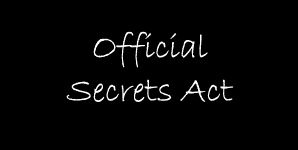Sometimes certain statutory acts come into force which one fails to understand whether it is good or bad for the welfare of the country. Official Secrets Act (OSA), 1923 is one such Act.
Official Secrets Act is one of the important laws for national security but a dark blotch and hindrance in the transparency and freedom of Press and governance. Due to the Act’s stringency, it has failed to tread the middle path and is contradicting other Acts.
As one can see from the year of the Act’s implementation, it was formed under the British rule. It was framed to protect the British officials from accountability from the ever-pestering and constant-questioning emerging Indian media. That time the Act was a means prevent disclosing information rather than deal with security. The Act itself does not properly define an official secret. As per the Act, official secret is any information in form code, password, plan or article which is kept secret from public. The act does not specify what actually a secret is, but clarifies that secrets cannot be of private nature. Post Independence, there have been amendments in the Act but ‘secret’ remains undefined. Rather the Act has become more stringent and increased penalties for not complying with it. This Act helps the government to regard any information as secret which may cause controversy or scam in the future. During the 1975 Emergency imposed by the then PM Indira Gandhi, Official Secrets Act (OSA) played a crucial role and the government used it indiscriminately to censor thr Press.
Looking at the Act from security point of view, OSA tries to prevent threats to national security, stop any information to get leaked and ensure that our political system is not sabotaged. It deals mainly with spying and unauthorised communication but its sections have been framed such that it hampers many more information.
The Official Secrets Act has been in contradictions with other statutory laws. The biggest contradiction is present in our Constitution. Article 19(1) of Indian Constitution provides us with the Right to Freedom of Speech and Expression. The OSA violate this right by virtue of restrictions put by it. The Act also contadicts Right To Information (RTI) Act, 2005. RTI provide citizens to seek information from any Centre or State’s ministerial department regarding any matter but sometimes bureaucrats use OSA to hide information from public. On one hand we have an Act which helps acquiring information while another provides hindrance in acquiring it.
Due to these contradictions, the government formed a panel a few months back to review the Official Secrets Act, make necessary changes and do away with excessive secrecy without compromising on national security.
Until some favourable amendments come into force, Official Secrets Act 1923 will continue to remain a necessary evil for our country.



19 Comments. Leave new
informative and well written article
Nicely written!
Thanks!!
Informative..!
Informative article…
Thanks everyone.
Deviant law but essential.Unique topic and well written!
Thanks Siddhant.
nice article…didnt know about this before!
I am glad I could help add something to your knowledge.
Very informative. Great choice.
Nice Topic and Very well Presented 😀
informative 🙂
Good job.
Good work 😀
Very informative.
Informative
Such an interesting to read 🙂
Nice